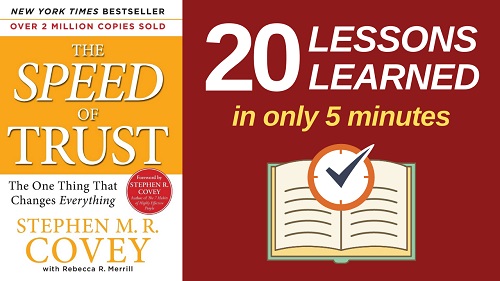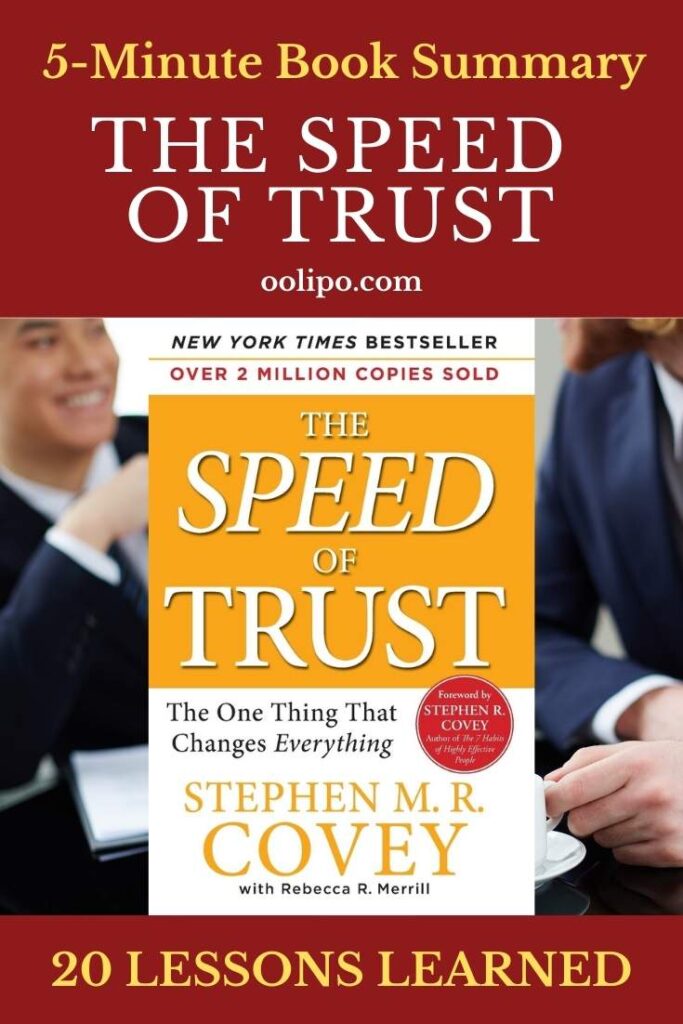The Speed of Trust is a self-help book written by Stephen M. R. Covey in 2006. In this The Speed of Trust summary, we dive deep into Covey’s perspective of building trust and being reliable.
Your power does not arise by itself. We have prejudices against people we meet for the first time. That’s why we need to know what needs to be done to gain trust. We need trust in order to gain the support of people in every field. In this book by Stephen M. R. Covey, he tells us about useful, proven ways to gain trust.

The Speed of Trust Summary with 20 Lessons Learned
Here are the 20 lessons to learn from The Speed of Trust Summary:
#1 Confidence Means Speed
For example, the more you trust your employees, the less you control their work. Or, the more you trust your partner, the less you control the accounts. Things get faster as the control decreases. In order to reduce supervision, trust must increase.
#2 Trust Makes Money
You need to allocate a share of your budget to take trust-based measures in your business. But if there is mutual trust, this money stays in your pocket. In enterprises with mutual trust, an increase in profitability is observed as well as the acceleration of production. The fewer procedures, the bigger the profit.
#3 Be Reliable
The more trust you give, the more trustworthy others will be. Unless the people around you have to be on the alert because of you, things will proceed in a more positive atmosphere.
#4 Integrity
It would not be an exaggeration to say that it is a feature that is most expected but not found in business life. We can hear a lot of lies, especially on paydays. Sometimes, when we will receive the product, many excuses can be made for delay. Instead of falling into these situations and losing trust, specifying the details at the beginning of the job prevents you from losing customers.
#5 As Long as I Make Money
This mentality causes you to lose confidence. Once you do your job properly, you will already earn money. It’s not worth losing a customer just to gain a little more. If you want to become wealthy, you have to think long-term.
#6 Behave According to Your Skills
Whatever your area of expertise is and what you are good at in that area, do not go beyond this subject. Don’t start by making promises about the issues you are not sure about and saying that we will solve them somehow later. Work to earn a net income in your best field.
#7 References
Evidence is more important than words. The references you have give you more confidence than the thousands of promises you will make and the contracts you will sign. Especially the comments of previous customers about you have a great impact on getting your next job.
#8 Caring
You should be more or less concerned not only with what your employees in your company are doing but also with how their lives are going in general. You can ask questions and give them ideas without going into their private lives. This will build a bond between you and gain their trust.
#9 Untrusted Environment
People now have a general distrust. Everyone has to act by hiding something. In places where there is no environment of trust, people start to act more and a negative atmosphere emerges.
#10 Are You Confident?
If you don’t fully believe you can do something, you cannot expect others to believe it. If you act as if you can do it even though you don’t believe it, especially experienced managers notice it immediately. First, you have to believe in yourself. For this, you need to have sufficient knowledge and equipment.
#11 Building Trust with Partners
The two companies’ trust in each other basically starts with their trust in their teams. If you can talk about your product or service without any doubt that you will do the job right, then you trust your team. This will be felt by the other company and an environment of mutual trust will begin to form.
#12 Getting Recognition
If your product and service have passed the recognition stage in the market, it will start to see more demand. The more awareness you get, the more you can gain new customers without having to express yourself too much.
#13 You will be cheated on
You can be deceived at any time in your business life or in your private life. These are the facts of life. You focus on the experience part of the job. There may be clues you missed. Think back to them. It is possible for you to move forward by taking more experienced and firm steps next time.
#14 After Losing Confidence
This has to be the hardest part. While it is not easy to even build trust, it is almost impossible to try to regain the trust that you have lost. Although a trust can be regained, one should not wait for it to return to its former state.
#15 Making People Stupid
No one is as stupid as you think or you are not as smart as you think. If you sometimes listen to other people’s lies and act accordingly, other people also listen to your lies and act accordingly. Even when things go wrong, be brave enough to say it openly and simply explain it.
#16 Judging People
We can be very cruel when we judge others. This is of no use to us. We may be satisfying our ego at that moment, but in the long run, we destroy the desire of the other party to do business with us. We must focus on our work. We should not personalize matters.
#17 Human Relations
This is a tip you should pay attention to. You cannot trust someone who is not honest with his family and friends in the business. It is foolish to expect someone who is dishonest even to their closest relatives, to be honest with you.
#18 It’ll Take Time
To gain trust, your actions must be spread over time. Trust is a form of belief. It is not possible to create this on the opposite side all of a sudden. You take the right steps and leave the rest to time.
#19 Being able to say no
One of the biggest indicators of being brave and reliable is being able to say “no”. Don’t force your terms so that no one gets offended. If you’re not sure you can’t do it, state this. When you make it clear to the customer that you cannot do a job, you may not be able to earn money for that job, but now you have a client. When that customer has a job that he knows you can do, he will never go anywhere else and will recommend you to his surroundings.
#20 Apologizing
Modesty gives confidence. Trying to show yourself superior creates the impression that you are hiding something. Clearly present your work and talent. In case of failure, take responsibility and apologize for your mistake. It will be more effective than the thousands of excuses you will find to save the situation.
Top 10 Quotes from The Speed of Trust
1. “Low trust creates hidden agendas, politics, interpersonal conflict, interdepartmental rivalries, win-lose thinking, defensive and protective communication—all of which reduce the speed of trust. Low trust slows everything—every decision, every communication, and every relationship.”
2. “The principle is simply this: We tend to get what we expect—both from ourselves and from others. When we expect more, we tend to get more; when we expect less, we tend to get less.”
3. “There are no moral shortcuts in the game of business—or life. There are, basically, three kinds of people: the unsuccessful, the temporarily successful, and those who become and remain successful. The difference is character.”
4. “In a high-trust relationship, you can say the wrong thing, and people will still get your meaning. In a low-trust relationship, you can be very measured, even precise, and they’ll still misinterpret you.”
5. “Above all, business success requires two things: a winning competitive strategy, and superb organizational execution. Distrust is the enemy of both. I submit that while high trust won’t necessarily rescue a poor strategy, low trust will almost always derail a good one.”
6. “One of the fastest ways to restore trust is to make and keep commitments – even very small commitments – to ourselves and to others.”
7. “The reality is that everybody makes mistakes. The issue isn’t whether you will make them, it’s what you will do about them. It’s whether you will choose the path of humility and courage or the path of ego and pride.”
8. “When you make a commitment to yourself, do so with the clear understanding that you’re pledging your integrity.”
9. “Whether you’re on a sports team, in an office, or a member of a family, if you can’t trust one another there’s going to be trouble.”
10. “Trust isn’t just the greatest currency, it’s the only currency. Once trust is gone in any form of currency, the value is gone.”
Free PDF Download of The Speed of Trust Summary to Save or Print
We created a PDF file with the summary and quotes on this page for easy access: Download The Speed of Trust PDF Summary. If you want to buy the paperback version of the book, check out this page.
Stephen Covey’s Speech About His Book
Covey’s Advice to All Leaders
Please take a moment to pin this post to Pinterest.
